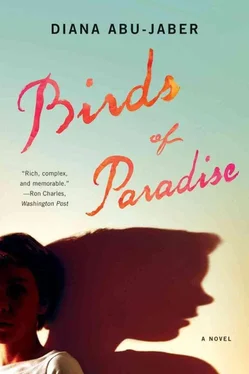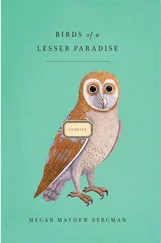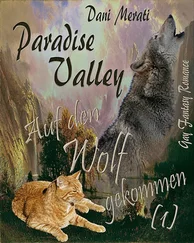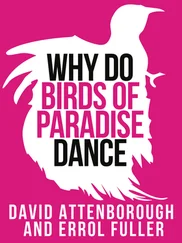They work easily together through the silent hours and heat. A few times during the course of the day, Avis hears the phone ringing inside the house and she knows she should go back inside: she imagines the dough overinflating, the orders unfilled. But there is such rare pleasure in sitting in the grass and sweating, skin pearly with humidity, the sweet chlorophyll stains on her palms: she can almost understand why someone would choose not to live inside a house. She thinks about the hours, whole days on end, Stanley spent working his garden. Outdoors, nothing but the scent of the air. Midafternoon, Solange goes into the house while Avis dozes in the shade near the birdhouse, sweat curling down her neck. After a while, she brings out a soup with a cloudy, briny broth, dashes of the peeled vegetable and chopped greenery they’d collected. They eat it, sitting together on the back step of the house, holding white porcelain bowls. It is ineffably good and restorative. Avis’s knees and back are stiff, but she finds that she’s so hungry she barely notices. When they finish, they put the bowls on the cement step.
Avis sighs, sitting back. She rubs her hands on her jeans and says, “I guess I’m going to have a grandchild.”
Solange sits back as well, placing her hands flat on her knees, her stern gaze seemingly drawn into herself. Avis watches her and begins to feel that the other woman is looking at something invisible — a sort of communing — and that the slightest movement could cause her to fly away. Eventually Solange turns her attention to her empty bowl. Her face is hard, her teeth an unearthly white against the purplish color of her inner lip. “It’s a strange thing, how life can roll out in front of you, so nice and welcoming. Like you been promised a trip to a beautiful island, where the trees and gates are full of flowers and the roads are like shining paths and the air smells like sweetness, and all around the ocean’s like a bright blue marble. You reach out for it…” Solange lifts the surface of her palm, uncurling her fingers. “You can almost touch it and smell it, you’re practically almost there. And then, just at the moment before you arrive…” She closes her hands into a fist, skin over her knuckles turning pale. “You have to understand — after something terrible— insupportable —happens to a person, it’s hard not to feel like the terrible thing is out there, everywhere, inside of every single thing you see and encounter. And it’s hard not to feel this sort of rage against everyone. Sometimes it takes everything a person has, not to let everything turn black, not to feel like everything you touch is scraping off your skin.”
Avis swallows. She wants to say, I know, I know, I know this, I do. But she doesn’t speak, sensing the size of what Solange is talking about: an enormity, bigger than anything she has known. Too big to look at directly.
Solange shifts her leg so the mynah steps up onto her knee, its scaly talons carefully opening and curling around her leg. It hunkers like a child in her lap and she strokes its head for a while, humming, its neck feathers ruffling up between each stroke. “A grandbaby,” she says at last, “is a stroke of luck.”
Avis blinks and shades her eyes with her hand. She lowers her chin onto the palm of her hand, studying Solange. “Yes, thank you,” she murmurs.
Solange lowers her shining lids and runs one finger down the back of the bird’s head. Avis eyes her, afraid that she thinks Avis doesn’t deserve a grandchild, as if believing a thing might be enough to keep a grandchild away.
For the rest of the afternoon, Avis digs rows of shallow furrows in which Solange drops tiny seeds. They cultivate a garden plot at the far western edge of Solange’s yard — a spot which probably cuts into the Martinezes’ property line next door. Solange amended the soil with her own compost, raised beds sparkling with minerals. From time to time a ghostly ringing from Avis’s house reaches them in whiffs through the trees.
“That’s Miami, calling for its sugar,” Avis says.
Solange’s face is traced with dark trails of sweat. She pats mounds of earth carefully over each seed. “You don’t care? You can afford to laugh at your patrons?”
Avis drags her fingers into the black soil, reviving a scent memory, distant scrap of childhood — the pleasure of digging in dirt. Does she disdain the people she bakes for?
Solange pats some of the raked bands of soil. “You might just poison someone that way. If you don’t care very much.”
She gives a thin smile. “Have you ever done that? Sort of lost your place in things?” She knows she should be worried: there’s a tower of pans growing in her sink, all sorts of tiny unfinished chores: separate eggs for a soufflé; place orders for nutmeg and coconut — tasks Nina had performed, efficiently and automatically. Avis rakes open another seam in the dirt and gestures for a seed, not ready to face her kitchen.
Solange raises her eyebrows without looking at her. “No, I don’t forget where my place is. I bide my time.”
Avis shakes her head. “I forgot what this was like.”
“Myra — the lady my mother worked for — she had no children of her own, so she tried to win me all the time.” Solange cast a sidelong glance at Avis. “She would give me bonbons and treats and dresses. She never wanted me to go outside. I was the only child there and it was a lonely place. The house was built on tall rocks above the water. Miles away from town. Sometimes it was so quiet we heard cars and voices — sometimes shooting. Once I thought I heard a man screaming. Mostly there was the sound of the waves, water the color of blue beads. I learned about France all the time, in the books the lady gave me to study. I read Dumas, Hugo. Later, Proust. The only thing I knew about my own home was what my mother taught me when we were outdoors together. Myra did everything she could think of to keep us apart. She told me terrible things about my mother. She said my mother had tried to smother me in my sleep, after I was born, but that Myra had saved me.”
Avis fingers the short, curling hairs at the nape of her neck, reflectively. “Do you think it’s true?”
Solange’s eyes seem to harden, as if she’d forgotten she was speaking out loud. She pauses and there is the wind’s liquid swish through the palm spears, the dark interstices between the fronds. A big sea-green anole watches them, frozen on the Martinezes’ loquat. For a moment, Avis has the oddest feeling, more tangible and familiar even than déjà vu, that all of this — the leaves and Solange and the lizard and the wind — has happened before, in just this way. The sunlight is brassy and lower now, cutting across their faces, and Avis scratches at her wrists: the mosquitoes will be worse soon.
“You know what I think?” Solange asks coolly. Avis sees again that slim crescent of teeth, her dark purple underlip. “I think my story is not something to wrap up with a bow and hand over. Not to you and not to anyone.”
THAT EVENING, WHEN AVIS goes back inside, it feels like a deliberate act, a small attempt at return. She moves through the house, switching on the lights and closing the shutters against the evening. Lamb follows her, twining between her ankles. She opens the front door and Lamb comes out on the front step with her: the neighborhood is falling into a velvet green darkness, the advance of the tropical night. A few people — high school students and domestics — are still out, strolling home, most of the commuter cars tucked in their driveways. It’s been a long time since she’s last stood on her front step, watching the neighbors come in.
Avis goes in to take a shower. While she’s toweling dry, she hears Brian’s key. He’s home early for the first time in ages and this, she realizes, makes her happy.
Читать дальше












